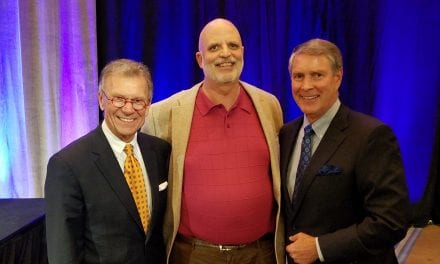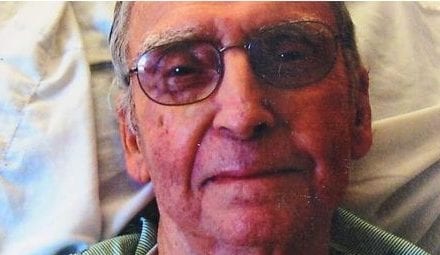The following is an edited version of an interview with Chip Conley conducted by Steve Moran, publisher of Senior Housing Forum and co-host of the Forum’s podcast.
By Pam McDonald
The following is an edited version of an interview with Chip Conley conducted by Steve Moran, publisher of Senior Housing Forum and co-host of the Forum’s podcast.
SHF: On February 11th Steve Moran published his video interview with hospitality entrepreneur, in-demand speaker, and author of five business books, Chip Conley. We’re going to give Chip’s ideas a deeper look with highlights from that interview. There may be a few issues with the sound.
Chip’s illustrious background includes founding his company at age 26 based on the innovative concept of boutique hotels. Eventually, his chain included over 50 hotels, mostly in California. He led the company for 24 years before selling in 2013.
Airbnb quickly enlisted Chip as head of global hospitality and strategy. As a newcomer to high tech and surrounded by a young workforce, Chip found himself acting as both a mentor and mentee. He describes this journey in his most recent book, Wisdom at Work: The Making of A Modern Elder.
Implementing the Principles of Modern Elderhood
It was this book that grabbed the attention of Senior Housing Forum publisher Steve Moran and spurred him to interview Chip. He cut right to the chase when he got Chip in front of his camera, asking, “How do we take these principles of modern elderhood into senior living and let them and our residents flourish?”
CHIP: Well, let’s look at some of the historical frameworks for the thinking around senior housing. Let’s start by saying I’m a neophyte. I’m not from the industry, so these are external observations. Think of me as the layperson with these observations. I may be wrong and, if I am that means that maybe the general public has it wrong as well.
In some cases, if we look back to the Sudden City Era, it was almost like, let’s surround ourselves with other people our age and have nobody other than the help be a different age. It’s almost like age was no longer an issue because everybody was the same age or roughly. It was almost like what Mark Friedman would call it, age apartheid.
It was sort of this separatist world where people would grow old together. It was also based upon the premise that people retired at 65 and then sort of generally went from working to not working almost overnight. Then they were going to do that for maybe 10 or 15 years and then die at age 75 or 80.
Premises That No Longer Work
So, there’s a bunch of premises here that don’t work so well anymore. Number 1 is the idea that people want to be separated from other ages. There’s more and more evidence that people in multi-generational living, working, and being with people of different generations is very life-sustaining for all of those generations, especially older people.
Secondly, a lot of people are going to work, by choice or by necessity late into life. So, the idea that you sort of retire and just play shuffleboard doesn’t make a whole lot of sense.
In fact, the idea that people want to be segregated not just from other ages, but they also want to be sort of in some suburban or exurban community way the hell out there that’s not part of the heartbeat of the city doesn’t make a lot of sense for a lot of people.
The idea as was true in the hotel industry, (this is where I can use my hotel background as a good example), generally speaking, when new industries get started, (speaking of Peak,) they focus on the base of the pyramid, the most fundamental. And so, for Marriott and Hilton and Holiday Inn, as hotel chains, they were focusing on standards and predictability.
But in the 1980s, what the boutique hotel sub-segment of the industry proved was, wow, people wanted more than predictability. They wanted an experience, they wanted design. They wanted a place that felt like it was very much the local flavor, especially a food and beverage restaurant or bar within the hotel.
The Boilerplate of Senior Living
Having said all that, what that means is, wow, the hotel industry had to start to be less predictable and less cookie cutter. Well, I think the senior housing industry is sort of still stuck in the 80s, much of it. It’s like there’s a boilerplate of what the design is and they just stamp it out whether it’s in suburban St. Louis, suburban Florida, or suburban some other place, Phoenix, it has that same template.
And so, I think people are looking for more personalized, more niche-oriented kind of places to live. They want inter-generational experiences. And why couldn’t you have a We Work in a huge facility. Literally an incubator for people in their 60s and 70s and 80s to actually go to the office, but the office they’re going to is not in some company downtown. It’s actually just across the green there where there’s a bunch of other people their age who all are working part-time as consultants or as coaches or as nonprofit board members. And that they actually have a place they can go to that feels like it’s the office.
I think all of that’s important. I think wellness is important. It’s way beyond just having a golf course, a swimming pool, and a fitness room. It’s also giving people the opportunity to try things they’ve never tried before. A movement studio, learning how to dance; an art studio, learning how to paint; bringing in experts who help people to imagine things that they’ve always wanted to do but have never done in their life. So, all of those things I think are things that senior housing needs to consider.
The Modern Elder Academy
Steve wanted to know more about Chip’s latest venture, the Modern Elder Academy, which Chip has launched and is conducting in Baja, California. Steve asks, “What happens there?”
Chip: Well, the premise of it was, gosh, if we’re going to live a lot longer, let’s take a step back from it and think about what societies historically have done when people are going through a transition.
When you’re going through puberty, you have a Bar or Bat Mitzvah, or Quinceanera to help you make the transition from child to adult. When you move from adolescence to adulthood, you have a commencement ceremony and you graduate from something. You get married, you have a wedding; you have a baby, you have a baby shower; you die, you have a funeral. But between baby shower and funeral, nada, there’s nothing. And, it’s partly because we added 30 years of life from age 47 in 1900 to age 87 in the U. S. in the 20th century.
So, there’s a need for us to take stock of the fact that midlife is full of transitions and yet we have created nothing that helps people to tap into the wisdom they’ve learned and how to repurpose it out there in the world. So, I decided to create this campus on the beach, almost three acres, that usually has about 18 people per week in our program. People come on a Sunday and they leave on a Sunday.
The average age is 52, so this is not elderly, this is elder. And, what do I define as an elder? It’s a relative term. If you’re a 34-year-old surrounded by 20-year-olds, you’re an elder. I think we’re trying to help people see that mutual mentorship is the future. It’s not about all of the power being held by the older people and that the physics of wisdom goes from old to young. It goes in both directions.
And so, it’s a great place for people to get curious in midlife about how to navigate their midlife transitions. Let’s acknowledge we have a lot of transitions in our life. We may lose a parent, we will lose a parent or both parents. We might get divorced. We may change our career or our job. We may have menopause if we’re a woman. There’s andropause if you’re a man. We may have health diagnoses we weren’t expecting. We’ll have empty nest syndrome if we have kids.
All of these things happen in midlife and we have zero in the way of rituals or rites of passage other than maybe some retirement party that’s usually not particularly exciting. And, I think that the idea of creating a rite of passage, a ritual, or a celebration for people in midlife, is a long time coming. And the experience so far of the 225 people who’ve gone through the program has been over-the-top positive.
Creating a Version of the Academy in Senior Living?
Steve asks how we might transplant or create a version of the academy in senior living, recognizing that we serve a much older age cohort.
Chip: You know, we’ve had people in their late 70s in our program and what’s clear is there’s something that’s quite baked into what the academy is about. It’s being a lifelong learner and creating the space for people to get liminal.
Now, liminal is a word that a lot of people don’t know, and I didn’t know three or four years ago when I started writing the book. Liminal basically means you are in transition. The ultimate liminality is a caterpillar to a butterfly, which is like, wow. It’s one thing and then it becomes another and in between, it’s the goo of a chrysalis, a cocoon.
Well, it’s almost like as you get older, you feel like you’re not supposed to be liminal anymore. You’re not supposed to be awkward; it’s something you did earlier in life. You’re supposed to have it all together. Well, I was very awkward at Airbnb my first year learning the tech industry and I’m very awkward today at age 58, learning to surf and learning Spanish.
But I got comfortable with the idea of being liminal or awkward and realized the only way I was going to get better at that was to actually throw myself into it. That’s part of what we teach at the Academy. I think it would be beautiful if there were something like an academy in senior housing where people could go do that three-day program for the person who’s always imagined painting, but the last time they did it was fingerpainting in kindergarten.
Curiosity is the elixir of life. I think if senior living could actually rethink of itself as a lifelong living place where people live longer in a more vibrant way, partly because they’re constantly learning. I think that’s a new way to think of senior housing.
The Fear of Atrophy
In conclusion, Steve points out that a common model for today’s senior communities is a cruise ship, but he worries about atrophy among residents, both of their physical and social skills.
Chip: Atrophy is a really critical word. It is something that happens as we get older. The only way we work against atrophy is to actually continue to use those muscles and whether it’s the brain muscle, the heart muscle, the physical muscles of our bodies, these are the things that help us stay vibrant longer.
But the thing that a lot of people don’t really look at (that is another piece that senior housing can focus on), is that there are heart and soul muscles that gets better with age. Our IQ doesn’t grow with time, but our EQ does. And we know, based on a lot of studies, there’s a U-curve of happiness and people get happier as they age interestingly, which is not what the societal narrative is.
Plus, they get smarter about their own humanity and emotions, as well that of others. So, I actually think there’s an element of figuring out how to harness all of that beautiful emotional and, to some degree, soulful and spiritual wisdom that’s gained as we get older and look at how to use it in the world.
Is it used by working with teenagers? There’s a beautiful program in Chicago where a seniors’ retirement home actually is connected with a Brazil high school. The Brazil students want to learn English and the retirement folks in Chicago just want to actually feel relevant still.
How do we create that kind of connection? How do we create mentorship opportunities? Wouldn’t it be interesting if a bunch of men and women who have some business and entrepreneurship background and are now in a retirement home actually opened themselves up to junior achievement people in high schools or literally to young entrepreneurs in their twenties and thirties to be mentors? So, I think there are lots of opportunities here.







